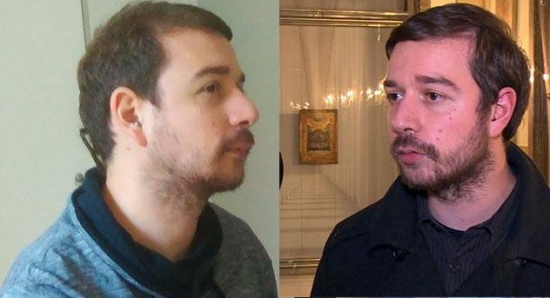Stevan Dojcinovic: It is horrifying when the state uses the secret police to track journalists
Published in Journalistic Lessons
on 4 - 11 - 2016 Author: Владо Ѓорчев
- Stevan Dojcinovic, leader of KRIK: There are corruption-related topics as much as your heart desires
Loving your country and doing your job is the key. It is stronger than the moment when the state will arrest the former ministers. The individuals who are strong, who will step forward are important. Afterwards, it’s late. There is no effect in arresting a dead horse
Author: Vlado Gjorchev
Probably more or less paranoid, but Stevan Dojcinovic, editor in chief of KRIK, one of the most influential media in Serbia, is an investigative journalist in the full sense of the word. We noticed this when we visited several investigative media in Belgrade within the EU project “Investigative journalism for inspiring reforms”. He is considered a big star in his country, but also a “traitor no.1”, as the pro-government media name him. Also, they call him a “sorosoid” and an “anti-state element”.
The Crime and Corruption Reporting Network (KRIK) is a nonprofit, nongovernmental organization founded to promote investigative journalism in Serbia. It was founded by a team of multiple award-winning journalists who have been dealing with disclosure of crime and corruption for many years.
KRIK is a part of the international journalistic network Organized Crime and Corruption Reporting Project (OCCRP), which also comprises nonprofit investigative centers and independent media from around twenty countries from throughout the world, the Balkans, Eastern Europe, all the way to Central Asia. OCCRP assisted the creation of KRIK and it is helping its development.
As Dojcinovic puts it, their focus is on crime and corruption in all society fields. They aim to help the readers to understand better the way crime and corruption affect their lives. KRIK strives to produce thorough investigative stories, as well as brand new news from this area. Additionally, KRIK has a data base on its website, which is a valuable resource both for the journalists and the public.
IT’S EASY TO FIND TOPICS IN A CORRUPT SYSTEM
What’s it like to be investigative journalist in Serbia?
Stevan: On the one hand, it’s easy to find a topic, because Serbia and Macedonia are on the same level, the corruption level is high. On the other hand, there is a lot of pressure on the investigative journalists and often campaigns against those journalists are led in the pro-government media, accompanied by threats, as well. For instance, just a while ago, our journalist Dragana Pekjo, was received threats in the social media. We immediately reported it to the police. So, the journalists are constantly pressured and thereby hindered in doing their job. Anyway, there are plenty of topics, there are stories everywhere, no matter where you look. Therefore, the journalists have one big plus and one big minus in the entire story. Also, there are always people who want to support the investigative journalism, such as our bigger donors. We are supported by the citizens, not only on social media by posting positive comments, but also financially, they finance us with small donations. Nevertheless, if you want a short answer, it would be that being an investigative journalist in Serbia is exciting.
In Serbia, they say that you are a traitor, sorosoid. The situation in Macedonia is similar.
Stevan: One week after I got back from a training in Macedonia, there were articles about me that I have been destroying the government. I didn’t find it odd because the situation in Serbia is similar. But, if it was for some journalist from Germany, he would have been extremely baffled, but I know the situation. The story, mainly, consists of data on who our donors are, followed by a fuss that they interfere with our work. The donors, on the other hand, have never requested any special topic for us to work on. We are writing projects and asking for money for investigative journalism in general, which means that we don’t arrange topics with the donors. However, this is used against us as a fact, and then we are represented in the media as western spies who are working against the country, and as “sorosoids” as well. It is horrifying when the state uses the secret police to track journalists and then it is after you, it wiretaps you, photographs you and all of this is used against me. It becomes even worse when I see photographs published against me, for example from meetings with my sources, and that is really horrifying. Plenty of those people can be harmed just because they cooperate with me. The investigative journalists always have secrets and disclosing the sources can harm them.
When Informer (tabloid covering the lives of journalists and the opposition – our remark) publishes an information against you, do you feel jeopardized when you go out on the streets?
Stevan: No, it depends. Here in Belgrade, after Informer publishes something, people from cafés, bartenders, taxi drivers salute me. Or they buy me a coffee. But when I go a bit further, for example, I’m from Krushevac, my neighbor there starts having doubts about me. When you are in a big city, you are usually the bloke, but Informer is here just to derogate you. Nonetheless, not everything is so benign, because every time they write some kind of a lie, the people start doubting about you. This isn’t naïve.
THERE WILL BE ARRESTS IN MACEDONIA
What’s your view on the political situation in Macedonia? Which are your assumptions regarding the crisis’ end?
Stevan: There will be plenty of arrests, definitely, that always happens. The thing is what is going to happen next. The problem in Serbia and in Macedonia is the same. We can criticize the government for being not democratic enough, that it is corrupt, but the question is whether our job is dealing with political topics or we should unveil corruption, what’s most important? Do you think that there is another good option in Macedonia that can succeed the ones in power now, even if they lose?
Is there a better option in Macedonia? What do Serbian people think about that??
Stevan: If there isn’t, then that’s a problem. I was completely disappointed with our opposition. For instance, they supported Milo Djukanovic (Montenegro’s Prime Minister – our remark) after the elections that obviously were rigged, votes have been stolen… The man who is related to a great deal of corruption, who is a lot worse even than our Prime Minister (Aleksandar Vucic – our remark). Here, he is constantly criticized, but over there, he is supported. There is always somebody arrested when governments shift. Therefore, somebody in Macedonia will be arrested for sure, and the same happened in my country couple of years ago, when many ministers were arrested. But, nobody was convicted. So, we have real arrests and political arrests. I am not interested in the government shift after which ministers are arrested. That is political arrest. I am interested in the country whose police is brave enough to arrest the incumbent minister. We have opened plenty of affairs related to Belgrade’s mayor, we have opened plenty of corruption scandals. I am sure that he will remain in power, but that is one character that is most likely to be arrested with the government shift. I won’t be glad then, because we need a government that has to something now.
So we need a legal state?
Stevan: Yes, that’s right. That’s why I think that these characters, your ministers, will be stuck in a prison, but that will bring no good to your country, because that is political vengeance. I think that’s not the key. Loving your country and doing your job is the key. It is stronger than the moment when the state will arrest the former ministers. The individuals who are strong, who will step forward are important. Afterwards, it’s late. There is no effect in arresting a dead horse.
This journalistic lesson was created within the framework of the USAID Media Strengthening in Macedonia Project - Media Fact-Checking Service Component,, mplemented by Metamorphosis. The journalistic lesson is made possible by the generous support of the American people through the United States Agency for International Development (USAID). The contents are the responsibility of its author and do not necessarily reflect the views of Metamorphosis, USAID or the United States Government. For more information on the work of USAID in Macedonia please visit its website (http://macedonia.usaid.gov) and Facebook page (www.facebook.com/USAIDMacedonia).

